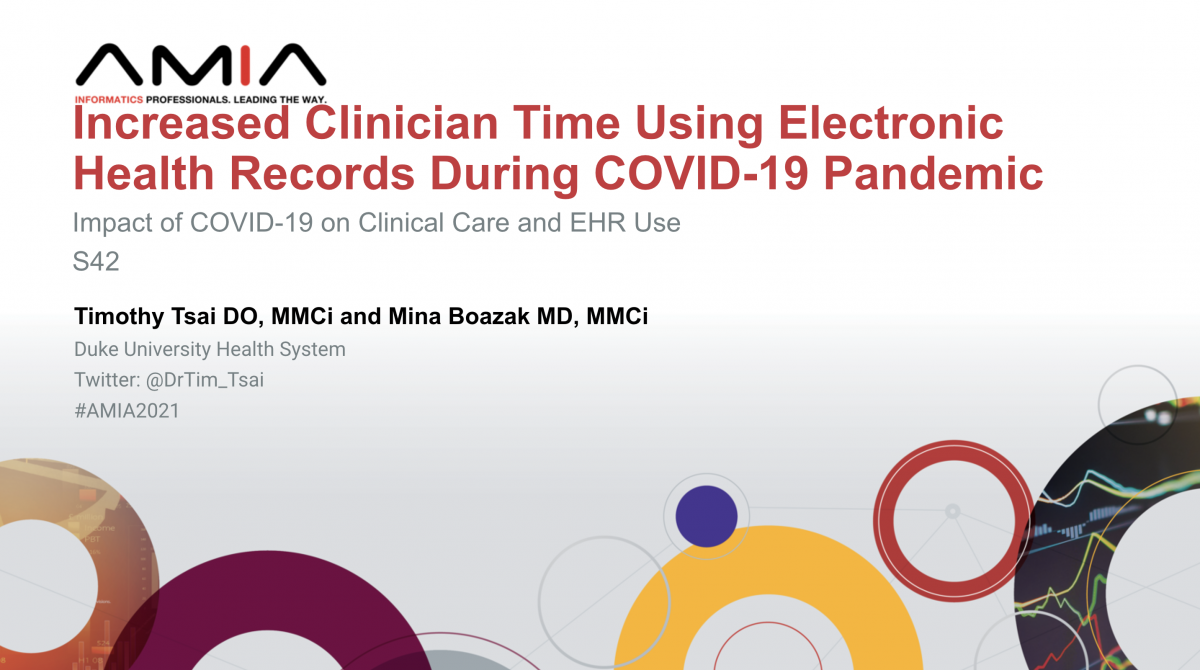
The American Medical Informatics Association (AMIA) held its first in-person gathering since the onset of COVID-19. The annual symposium took place in San Diego, CA on October 30 through November 4, 2021. AMIA is the professional home for Informaticians – individuals who use data for good. In keeping with the state of the art for the development of AI model was a focus on diversity, equity, and inclusion. A number of presentations including two from the student paper competition, explored methods to examine bias in data models. Perhaps unsurprising was multiple papers showing the potential for bias based upon race and gender that sparked much debate both during and after presentations. Research like this has potential larger implications on the implementation of Duke’s own AI models.
Fast Healthcare Interoperability Resources
The yearly FHIR applications competition showcased some of the most innovative apps with notable focus on tools that integrate with patient electronic health record and support chronic disease management. A previous Duke physician, Ken Kawamoto, MD, PhD, won first place for Disease Manager - an application that supports multiple chronic diseases from one iFrame within the Epic EHR. In addition to the patient facing apps, there was much discussion on the benefit of using FHIR apps for clinical decision support with a rough consensus that most CDS is best delivered from within the EHR and that external formats using FHIR have significant technical limitations. This leads to opportunities to develop CDS that is transferable to other institutions by tools such as Epic’s turbocharger, an area of further research and discovery.
Duke Representation

Dr. Timothy Tsai, of Duke Urgent Care and a Clinical Informatics Fellow, presented an oral presentation on the impact COVID-19 had on clinician EHR usage. This was a collaborative effort with his co-author, Dr. Mina Boazak, and mentor Dr. Eugenia McPeek Hinz. In it, he discussed the growing volume of patient messages compared to a steady volume of appointments and the impact of telehealth as a contributing factor. The Keynote Address was given by Dr. Eric Topol of Scripps Research Translational Institute as he highlighted the opportunities and impact of machine learning in medicine. An essential component of the AMIA Symposium is the Year in Review which is the culmination of the AMIA working groups identifying landmark and impactful articles throughout the year.
 Another thought-provoking session explored the relationship between providers and the electronic health record. The general consensus is that there are opportunities to create a synergistic relationship with a multidisciplinary approach that includes all of its stakeholders.
Another thought-provoking session explored the relationship between providers and the electronic health record. The general consensus is that there are opportunities to create a synergistic relationship with a multidisciplinary approach that includes all of its stakeholders.
Finally, a number of late breaking panels highlighted how academic and industry informatics institutions supported public health initiatives including sharing data at the state level and supporting mass vaccinations.
AMIA 2022
Save the date for next year's conference, November 5-9, 2022. The location and theme are yet to be announced.
A special thanks goes out to Drs. Genie McPeek Hinz and Timothy Tsai for reporting on the conference.